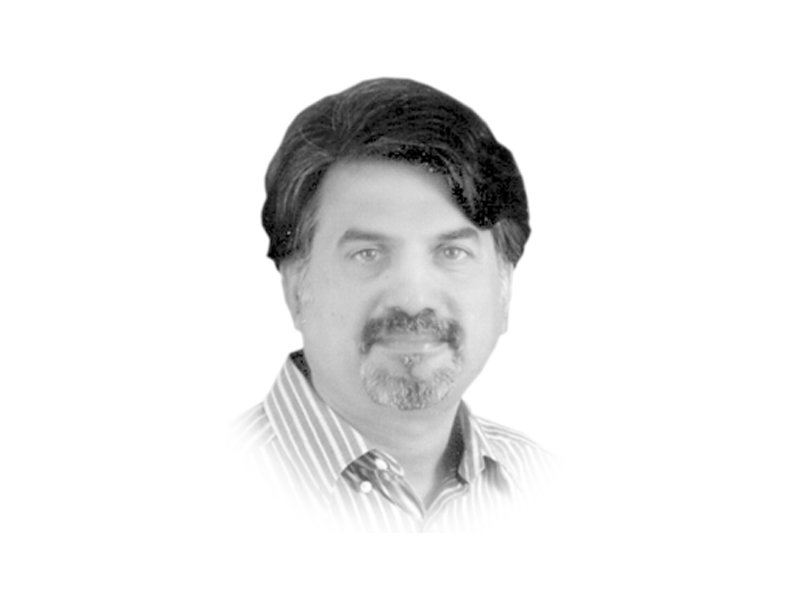
In the post-attack debate in our electronic as well as print media the blame of attack is being laid on the shoulders of India linking it as an Indian attempt to derail the possibility of holding the final of IPL in Lahore — something that was being seen as the ‘we can do it event’ to bring international cricket back to the cricketing fields of Pakistan. The suicide bomber neither came from India nor is the TTP an organisation that is based in that country. However, if the long arm of the Indian intelligence can reach deep into the heartland of our country and rent suicide bombers to undermine our security then that too is more reflective of our poor counterintelligence than their exceptional intelligence ability. In short, it is our own poor civil and military security preparedness that contributes to our lack of security. The enemy (whosoever it may be) only takes advantage of this unpreparedness.
Given that the TTP has taken responsibility for the attack, we should be more focused in how to set our own house in order rather than find excuses to hide behind the curtain of ‘blame India’. Even if we blame India such blame will fall on its deaf ears and it’s not only the deaf ‘Indian ears’ we are talking here it is the ‘world’s ears at large’. The problem with our insecurity is not that a suicide bomber can pop up at a crowded place and blow himself and many around him to pieces — the problem is that we have become too insensitive to do anything about this. The world has stop coming to us (IPL) not because of the insecurity or ‘terrorism threats’ — they are pretty much there in New York, London, Berlin and Sydney as well. They don’t come here because they know that we lack the national resolve (and please don’t mistake that for military resolve) to stand up and fight against it. Blessed with a leadership that sets lopsided national priorities — fighting terrorism is a ‘hard business of national security’ from which the civilian leadership has taken its hands off. This is not a recent phenomenon — the one-dimensional(military operation) execution of the National Action Plan (NAP) bears witness to the strategy of reluctance employed by the current government. At the heart of this government’s strategy of reluctance has been its deliberate choice of not executing military operation in Punjab — despite the military’s insistence for it and the resultant political drama that marred the complete debate in the mud of controversy and gifted this nation ‘Dawn Leaks’. Is there a method or way forward to prevent the terrorists from hitting us whenever and wherever they want with such impunity? If there has been none — Can we find one now?
It starts from the political field where the leadership instead of making choices (finding political will to fight extremism) is more content on taking sides. All political parties have political manifestos that showcase their ‘ideological tilt’. Yet in matters of attaining political powers and seeking the reins of governance not one but all settle their differences and embrace one another in a big ‘political huddle of compromise’. Those collecting charities in the name of the religion and those seeking the foreign funds to run the mills and factories that produce men like Nasrullahs all sit in a big ‘hypocritical political merger’ with those that raise the flag of rooting out extremism and fighting terrorism ‘until the last terrorist is alive’. It is this lack of ‘political will’ which is considered hypocritical by a global audience that questions the inability to take an absolute side on the issue of extremism by the major political parties in this country– a gap in our words and deeds popularly termed our ‘policy duality’. And when the world reacts to demonstrate how ‘our hypocrisy’ is not ‘their hypocrisy’ by denying visas to members of the Senate (Hafiz Hamdullah and Abdul Ghafoor Haidri) who they (the world) think have an ‘extremist ideological tilt’— we instead of searching for an answer why, react by saying that we will also demonstrate quid pro quo and extend the same treatment to their dignitaries hopeful of visiting us.
Does the elevation of a person from the streets of the city to the chairs of the Senate bring a change in his/her ideological thinking? Have the two senators any good words to speak about the USA? Barring that — just google the statements of the leader of their party JUI (F) and you would be questioning why these senators in the first place should be interested in going to an ‘infidel and an enemy of our country?
Pakistan deserves a political leadership that should correctly read the threat, preempt it and then utilise all resources at its disposal to mitigate it and protect the people from it. But is the safety and wellbeing of the people of this country the top priority of its political leadership? Do we have a national security staff that knows what constitutes our national security? Who is it for? And how it is to be achieved?
‘Hit them before they hit us’. ‘If they hit us we will hit back harder’ are the battle cry’s of the nations that are not confused in how they want to fight the war against terror. It is not clear what guides the current governments strategy of reluctance to go after the swarm of Jihadis and militant organisations nested in Punjab. But if it is the fear of loss of its vote bank in southern and central Punjab then rest assured that the security reality will catch up sooner with this government than the political reality.
In the military jargon it is said that ‘the generals adjust the strategic basis of their operational plans in light of the civilian dictates (policy)’. However, when the execution and implementation of military operational plans is delayed (Punjab) on purpose then the consequent environment of insecurity and uncertainty (worsening security environment) itself dictates the adjustment of policy in view of the operational reality(military aim of winning war on terror being put to hold).
If it is the policy of the current government not to conduct military operations (Karachi-style Rangers operation) in Punjab then that policy will now be tested. Also tested would be the military commander’s resolve. How would General Bajwa react to this terrorist attack and their threats? It’s time we saw through his words and deeds something of his predecessor in him.
Published in The Express Tribune, February 16th, 2017.
Like Opinion & Editorial on Facebook, follow @ETOpEd on Twitter to receive all updates on all our daily pieces.

1729161093-0/liam-(4)1729161093-0-165x106.webp)


1732603002-0/lamar-(4)1732603002-0-165x106.webp)







COMMENTS (6)
Comments are moderated and generally will be posted if they are on-topic and not abusive.
For more information, please see our Comments FAQ